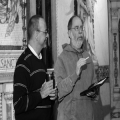You have no items in your cart. Want to get some nice things?
Go shopping
We retired to Moorhead on doctor’s orders. Moorhead, by the river and the North Dakota prairie. Old friends, familiar faces, the doctor said. Anything to keep Phil anchored.
You were always a man with big ideas. That made you restless; I knew that when I married you. No, we didn’t end up in Paris to eat croissants and drink burgundy. We didn’t even make it to a cramped condo in Fort Myers to drink mai tais and eat oranges ’til the worms came. Instead, we ended up in Moorhead, where we said we’d never die. Six feet under stagnant ponds, you said, in mosquito beds, our bowels clogged with walleye.
Moorhead was our lot. So you gave it your best. Early-bird breakfasts with our old dullard friends. Cribbage nights. Bingo on the weekends. The months passed strangely. Not sure how we survived. But at least you stayed the same. You weren’t getting better, but you weren’t getting any worse. Just more quiet.
That’s why I didn’t worry like I should have when you talked about the ark.
I found you on the deck, sitting on the Adirondack, wrapped in your old wool robe. Thought you were in a sleepwalk. But your eyes were open, looking west. You told me that a vast sea once covered this place. Billions of gallons of water, drowning Minnesota. You said those seas will return — salt seas this time, you said. That we have to be ready. Have to be.
I looked out. All I saw was the prairie, the mosquitoes. I said okay. I said come to bed, thinking it would pass.
But the next night you were out there, flashlight, whisk broom, dust pan, scouring the earth for fossils. Treasure trove, you muttered, digging, dusting, finding little seaborne skeletons. Holding them up to the light, their tiny bones making prisms across your hands.
It wasn’t long after that we made our first trip to Home Depot, maxing-out credit cards, buying reams of boat-building blueprints. Wood. Clamps. Sealant. Strings of lights so that you could work at night.
And the crowning touch: his ‘n’ hers Black & Decker power saws — 12-amp motors and those killer 18-tooth carbide blades.
Best Christmas present you ever gave me, you said, sniffling, tearing up, and I had to turn away.
Encourage you, I thought, let it run its course. Maybe it’ll go away.
It didn’t.
You piled and sawed and pounded that hammer unmercifully, a skiff first, then the frame of the ark. When the neighbors complained about the noise and the dust, you said, hey, they’ll be grateful when we invite them aboard.
Suddenly, it all started to make sense. No, I didn’t worry when we had to borrow money to pay for groceries, or when the wooden frame towered over our house, even when the sawdust covered everything.
But I should have.
As the neighbors began bleating their complaints, and took you to court, and cacophony filled the antique wood-paneled room, the judge — old man McIntyre, 100 at least — just sat and shook his head. Finally, gaveling down the noise, he asked if you had anything to say.
Nope, you said. Can’t hardly argue with the truth.
Opening his mouth, then closing it, the judge finally said, just stop, will you, Phil? OK?
The vast salt sea, you began, spreading out your hands, but by then I had you turned around and moving.
You wandered off that night, into the dark undulations of the prairie. I imagined that you were taking soundings of the surface.
When you didn’t come home the next morning, I called the county. They sent out search teams, men in hiking boots and rubber gloves. Tracking dogs. Couldna got far, they said, old man like that.
I knew better.
They found you two days later, near twenty miles away, across the dry, flat ground.
Coroner did an autopsy. I said no, but he said yes. Fussy little man with crumbs on his vest.
Funny, he said. Salt encrusted on his skin, he said. Like a cod.
In his lungs, too. Like he drowned.
The wind blows cold and lonely off the prairie at night, hurtling along at ground level, then rising up, washing over the house.
It sounds like the sea.
I hear your voice in it.
You never finished that ark, that enormous bone-white skeleton dwarfing our house.
I go to the garage in my housecoat.
I pull out the skiff, test the water, and push off.

Abby Mendelson and Vincent Rendoni
Abby Mendelson, Ph.D., is an Instructor in the Chatham University MFA program. An award-winning author of numerous works of fiction and non-fiction, he has published book-length studies of his adopted city of Pittsburgh, and two collections of short stories and three novels, his most recent being The Oakland Quartet. Seattle resident Vincent Rendoni has an MFA in Fiction from Chatham University. He released his chapbook, In the Methow Valley, in 2011, and has previously published fiction in The Rind, Shady Side Review, and FictionBrigade. Flash fiction writing partners since 2012, their stories have appeared in Fiction Southeast, Lime Hawk, Burrow Press Review and Atticus Review.





You have a point, and I say that even as a man named David. Question is, which annual prize should we pay attention to instead?